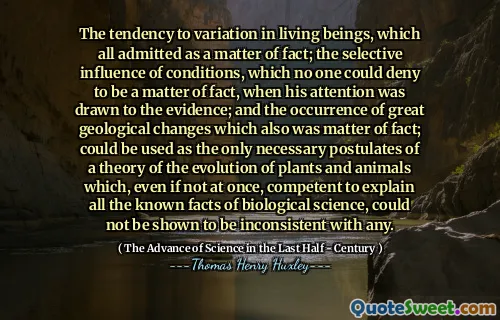Thomas Henry Huxley was a prominent English biologist and an advocate for Charles Darwin's theory of evolution. He played a vital role in spreading the ideas of natural selection and contributed significantly to the field of comparative anatomy. Huxley's work laid the groundwork for modern biology, and he became known as "Darwin's Bulldog" for his fierce defense of evolutionary science against its critics. In addition to his scientific contributions, Huxley was also involved in education and public philosophy. He was a strong proponent of science education and founded the Marine Biological Association. His writings, which include essays and popular science books, helped make complex scientific concepts accessible to the general public, encouraging a greater appreciation for science and rational thought. Huxley's legacy lives on in the fields of biology and education, where his ideas continue to influence contemporary scientific discourse. His commitment to truth and scientific inquiry, along with his belief in the importance of critical thinking, has made him a significant figure in the history of science.
Thomas Henry Huxley was an influential English biologist known for his advocacy of Charles Darwin's theory of evolution. His extensive work in comparative anatomy and his passionate defense of natural selection earned him the nickname "Darwin's Bulldog." Huxley's research and writings laid a strong foundation for modern biological science.
Beyond his research, Huxley was a dedicated educator who emphasized the importance of science in schools. He established the Marine Biological Association and wrote extensively to communicate scientific ideas to the public, making them more accessible and engaging.
Huxley's impact on biology and education endures, as his ideas continue to resonate in ongoing scientific debates. His legacy of critical thinking and adherence to scientific inquiry remains relevant, establishing him as a key figure in the advancement of modern science.
More »
Today Birthdays
1729 -
Edmund Burke
1949 -
Haruki Murakami
1954 -
Howard Stern
1876 -
Jack London
1993 -
Zayn Malik
1951 -
Kirstie Alley
1863 -
Swami Vivekananda
1923 -
Alice Miller
1987 -
Naya Rivera
1825 -
Brooke Foss Westcott
1944 -
Joe Frazier
1951 -
Rush Limbaugh
1964 -
Jeff Bezos
1978 -
Jeremy Camp
1628 -
Charles Perrault
1856 -
John Singer Sargent
1970 -
Kaja Foglio
1953 -
Rick Santelli
1986 -
Gemma Arterton
1968 -
Raf Simons
1958 -
Christiane Amanpour
1966 -
Olivier Martinez
1996 -
Ella Henderson
1917 -
Maharishi Mahesh Yogi
1949 -
Ottmar Hitzfeld
1928 -
Ruth Brown
1968 -
Heather Mills
1946 -
George Duke
1968 -
Rachael Harris
1923 -
Ira Hayes
